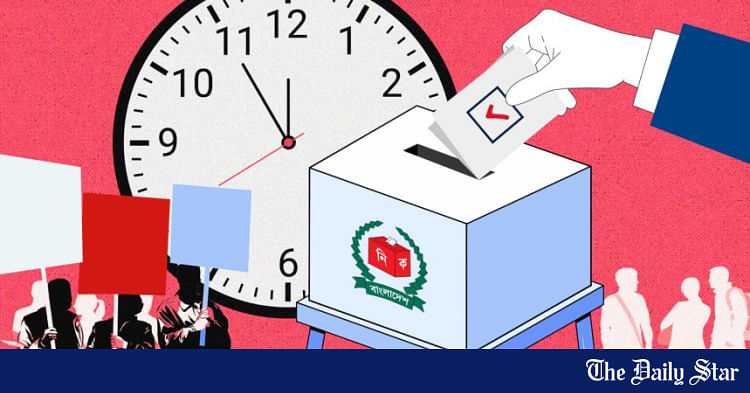Chief Adviser Prof Muhammad Yunus’ announcement on the eve of Eid-ul-Azha that the next national election will be held in the first half of April 2026 has triggered mixed reactions from political parties.
BNP and like-minded parties described the announcement as “disappointing,” while Jamaat-e-Islami and the National Citizen Party (NCP) broadly welcomed it.
In a televised address on Friday, Prof Yunus explained that the interim government assumed office following the August 2024 fall of the Sheikh Hasina-led Awami League government, based on three main mandates — reforms, justice, and elections.
“I believe by next Eid-ul-Fitr, we will reach an acceptable point on reform and justice. Especially, visible progress will be seen in the trial of crimes against humanity, which is the government’s collective responsibility to the martyrs of the July mass uprising,” he said.
“After reviewing ongoing reforms in justice, governance, and election processes, I announce that the next national elections will be held on a date in the first half of April 2026,” Yunus announced.
He added that the government aims to organise “the freest, fairest, most competitive, and most acceptable election in history,” and discussions have been held with all parties in this regard.
The announcement came as BNP and allied parties had hardened their stance on elections by December this year.
On May 28, BNP acting chairman Tarique Rahman said the next general election must be held by December and called on party activists and leaders to prepare to ensure that.
Yunus had previously indicated that elections would occur between December 2025 and June 2026, depending on reform progress.
NCP, composed of July uprising leaders, supports holding elections only after reforms are complete.
Jamaat-e-Islami initially aligned with NCP’s position but later suggested elections could take place in February before Ramadan. Last week, Jamaat leaders indicated elections might happen between December and April.
On May 21, Chief of Army Staff General Waker-Uz-Zaman said that elections should be held by December, stating, “Bangladesh needs political stability, which can only come through an elected government, not unelected decision-makers.”
MIXED REACTIONS FROM POLITICAL PARTIES
Following the announcement, BNP convened an emergency standing committee meeting and issued a press release reiterating its demand for elections by December. They cited Ramadan, public exams at secondary and higher secondary levels, and weather concerns as reasons.
BNP also warned that the combination of weather and campaigning during Ramadan might lead to the postponement of the polls.
On Saturday, BNP Secretary General Mirza Fakhrul Islam Alamgir, who was returning from Thailand after receiving treatment, stated that the announcement not only “disappointed” his party but also the whole nation.
In contrast, Jamaat Ameer Shafiqur Rahman welcomed the tentative election date, expressing hope that the government will ensure a free, fair, neutral, and acceptable election within the declared timeframe.
He said the nation has a strong desire for reform, justice, and elections, and that through the formation and implementation of the “July Charter”, Bangladesh can return to a proper democratic path.
NCP, in its reaction, said it would not oppose elections by April next year if key reforms and constitutional changes are completed before that.
“We believe fulfilling the July Declaration and July Charter and announcing a clear election timeline will meet national expectations,” said Akhter Hossen, NCP member secretary. He added that reforms and justice must be visible before elections and advocated for a Constituent Assembly election to implement a new constitution.
LEFTIST PARTIES EXPRESS DISSATISFACTION
Communist Party of Bangladesh General Secretary Ruhin Hossain Prince called the election timeline ignores public opinion.
“Most political parties, and ordinary citizens we’ve spoken with, want the election to be held within this year by December. We want the same,” Prince said.
Revolutionary Workers Party General Secretary Saiful Huq said the chief adviser ignored “the consensus for December elections”, warning that an April election would “frustrate many”.
Questioned April’s suitability, he said January to mid-February would have been a better choice for arranging polls.
He warned that the decision could deepen the political crisis and widen the gap between the government and political parties.
Bangladesh Samajtantrik Dal’s General Secretary Bazlur Rashid Firoz also questioned the timing of the polls and argued that key reforms and judicial progress could be completed by December.
He also said polls in April may disrupt SSC exams, which are scheduled for April.


